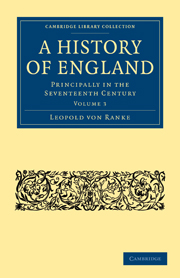Book contents
- Frontmatter
- Contents
- BOOK XI THE COMMONWEALTH IN ENGLAND, 1649—1653
- BOOK XII THE PROTECTORATE OF OLIVER CROMWELL, 1653–1658
- BOOK XIII FALL OF THE PROTECTORATE AND THE COMMONWEALTH. RESTORATION OF THE MONARCHY, 1658—1660
- INTRODUCTION
- CHAP. I Attempt to continue the Protectorate
- CHAP. II Attempt to form a Commonwealth on a new basis
- CHAP. III Royalist movements in the summer of 1659
- CHAP. IV Supremacy and constitutional projects of the Army
- CHAP. V Lambert and Monk. Restoration of the Rump Parliament
- CHAP. VI Anti-republican movement. Monk in the City
- CHAP. VII Recall of the King
- BOOK XIV THE FIRST FIVE YEARS UNDER CHARLES II. THE RESTORATION OF THE ANGLICAN CHURCH
- BOOK XV THE DUTCH WARS OF CHARLES II. ESTABLISHMENT OF THE PROTESTANT AND PARLIAMENTARY CHARACTER OF THE CONSTITUTION 1664—1674
CHAP. IV - Supremacy and constitutional projects of the Army
Published online by Cambridge University Press: 07 June 2011
- Frontmatter
- Contents
- BOOK XI THE COMMONWEALTH IN ENGLAND, 1649—1653
- BOOK XII THE PROTECTORATE OF OLIVER CROMWELL, 1653–1658
- BOOK XIII FALL OF THE PROTECTORATE AND THE COMMONWEALTH. RESTORATION OF THE MONARCHY, 1658—1660
- INTRODUCTION
- CHAP. I Attempt to continue the Protectorate
- CHAP. II Attempt to form a Commonwealth on a new basis
- CHAP. III Royalist movements in the summer of 1659
- CHAP. IV Supremacy and constitutional projects of the Army
- CHAP. V Lambert and Monk. Restoration of the Rump Parliament
- CHAP. VI Anti-republican movement. Monk in the City
- CHAP. VII Recall of the King
- BOOK XIV THE FIRST FIVE YEARS UNDER CHARLES II. THE RESTORATION OF THE ANGLICAN CHURCH
- BOOK XV THE DUTCH WARS OF CHARLES II. ESTABLISHMENT OF THE PROTESTANT AND PARLIAMENTARY CHARACTER OF THE CONSTITUTION 1664—1674
Summary
The men who had overthrown the Protectorate had thus been equally successful in crushing a widespread combination in favour of the monarchy, which had enlisted sympathy both at home and abroad. They excited respect and even fear among foreign powers.
It may be taken as significant of the state of affairs after Lambert's victory, that on the 3rd of September Parliament issued a fresh ordinance, compelling every one to swear never to recognise, not Charles Stuart only, but any of the descendants of King James, and to oppose all attempts at restoring a House of Lords in any shape whatever. Republicanism was everywhere exclusively predominant.
At the same time, however, its supporters were anything but united among themselves. Their joint victory revived the antagonism which had formerly set Oliver Cromwell at variance with Parliament, and had finally destroyed the Protectorate so soon as this allied itself with the civil power. Whatever form the civil authority in the Commonwealth assumed, the army was resolved not to submit to it. The outbreak of the recent disturbances had for the time suppressed the feud: this quelled, the flames again burst out as fiercely as before.
The army considered it absurd that a mere lawyer, like the Speaker, because he had delivered their commissions to the officers, a duty formerly entrusted to the commander-in-chief, should behave as if he himself held that office. They suspected moreover, that in virtue of these commissions Parliament reserved to itself the right of disbanding the army when it thought fit.
- Type
- Chapter
- Information
- A History of EnglandPrincipally in the Seventeenth Century, pp. 251 - 260Publisher: Cambridge University PressPrint publication year: 2010First published in: 1875



